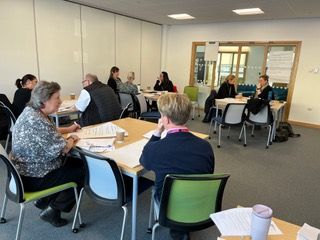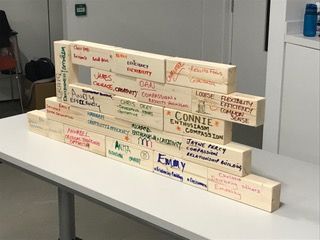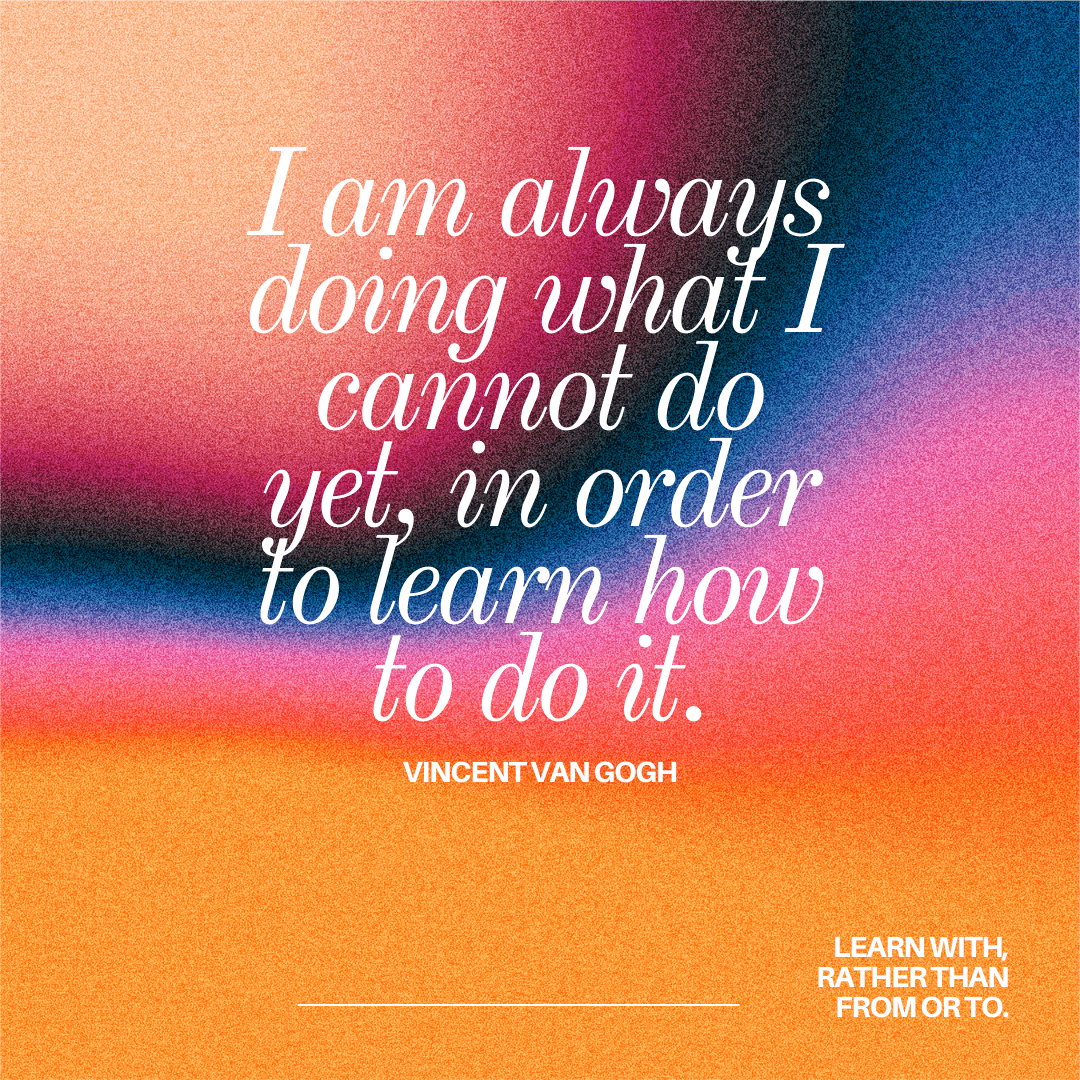Anyone who knows me professionally will know that I am passionate about Peer Learning and building safe learning communities where Leaders at all levels can share their experiences, get really curious, problem-solve together and, most importantly, lift each other up.
It is becoming a bit of a forgotten art in the workplace as trends have moved towards asynchronous learning where individuals access set content at a time to suit them, often alone and isolated from those they work with and through. Informal peer learning has also been impacted by the move to hybrid and remote working in many contexts.
You can hear more about my thinking on Peer Learning on the Training Designer’s Podcast April 2023 Podcast, read about my free Peer Learning Network for Leaders here or take a look at the resources page for blogs relating to Peer Learning. Let’s talk more about the many benefits of
Learning with, rather than learning from or learning to
What is it?
Peer learning is the process whereby
individuals acquire knowledge and / or skills through active reflection, exploration, sharing and support between people with others who are not in the role of ‘teacher’ or ‘expert’.
It is about helping those around you to learn by learning yourself through doing and it is reciprocal in a number of ways.
- Bring your challenges and issues to be solved whilst being open to sharing your own ideas, experiences and learning with others
- Develop new insights and ways to move forward with energy whilst supporting others to develop their own awareness
- Be rewarded through your own learning whilst helping others to learn and feel validated and valued
Because peers learn themselves by helping others to reflect and learn in peer learning, it requires active engagement. The process really thrives when spaces are created where people can show up as their whole authentic selves, fully committed to their own learning and to supporting others to grow too.

Who are my Peers?
We could often benefit from widening our thinking about our peers. Peers do not have to be at the same leadership level or in the same kind of role. If I am a Director of Sales I may benefit from listening to Operational Directors about how they are supporting their teams to collaborate or a Team Leader in Manufacturing might open up a new way of thinking by problem solving with a leader from Retail or someone who has a very different kind of team.
In Peer Learning it should not be not about any kind of equal power or authority and more about having a common goal or coalescing around a specific topic or challenge. So when thinking about your Peers look for what people have in common and what is different. We know from the extensive research on creativity and innovation that diverse views and perspectives are more likely to stimulate breakthroughs with some of our stickiest problems.
You can read about the Leaders Together Apart Peer Learning Network which I founded in 2020. This is a free Peer Learning Network for leaders across all sectors and industries who are interested in exploring and deepening their leadership practice.
Who is it for?
Everyone is the short answer! We already engage in peer learning every day. When we ask a colleague who the person is to contact about an issue. Or when a friend asks us a really great question after we have just downloaded all the things that are on our mind.

Peer Learning is a form of social learning which happens all around us and in every part of our lives. In a professional context, Peer Learning seeks to make the most of what often happens by accident.
It is not focussed on any area of specialism or level of expertise. It can be enjoyed by everyone at every stage of their career lifecycle.
How does it work?
Peer Learning comes in many forms. You will be familiar with some, if not all, but you can listen to my Podcast with the Training Designers Club if you want to learn more. For example:
- Workshops
- Feedback
- Action Learning Sets
- Communities of Practice
- Project reviews
- Lunch and learns
- Lessons learnt reviews
The saying, ‘form follows function’ is important for Peer Learning. Whatever the activity, peer learning happens when individuals are supported to share, explore, develop and create together. It is the magic that happens when you spend time with people sharing ideas and challenges and thinking through next steps. A workshop could be very oriented towards Peer Learning or focus solely on passing information to a passive audience. The design and facilitation of a workshop is what shapes whether peer learning is an integral goal for the session.
Peer Learning needs some structure and facilitation to get it off to a start in any organisation or group. Groups can become self-managing over time and should start to shape what works for them and what does not as they learn together.
I particularly like the 3 characteristics for participation in social learning developed by Etienne Wenger-Trayner and Beverley Wenger-Trayner1 and I use these to guide my work in peer learning.
- Caring to make a difference – being driven to develop and grow our own expertise as well as supporting the wider systemic changes the group may be working towards
- Engaging in uncertainty – working at the edge of our own understanding and being able to be vulnerable, to ask questions and to explore together
- Paying attention – to each other, to the time peers have together and to what individuals and the group are trying to achieve amongst all the distractions we know leaders face
Peer Learning is definitely not about sitting listening to an ‘expert’ telling you everything you need to know on a topic. It is a fully participative experience and can draw on a wide range of approaches involving mind, body and spirit.
Why invest?
So many reasons, but let us start with
- There are fewer and fewer business challenges that we can solve on our own, or within the confines of our immediate team so we need to find a way of learning across teams and operational silos and even organisational boundaries
- We need to support colleagues at all levels to hone critical reflection, learning and networking skills to be able to change at pace and continue to grow to meet tomorrow’s needs. More people need to know how to learn and learn continually throughout their careers
- There are exceptional skills, expertise and resources in every organisation and network which go unnoticed and unused as we rely on bringing in external expertise (which is not always the best answer)
- Organisations are increasingly suffering from siloed working, exacerbated by remote working and increasingly dispersed teams. This is often highlighting misunderstandings and disconnection with few opportunities to resolve those tensions
- Peer Learning creates a sense of community and belonging in those who engage. This is an employee and organisational need that is on the increase post-pandemic2
- Can be low cost depending on how it is structured, it is grounded in the organisation’s context and will suit a mixture of learning needs and approaches as it has respect for different experiences and views.
I believe that Peer Learning can support organisations to surface and access the resources that they have internally to solve their business challenges. The resources that know your context better than anyone and are often already operating effectively in your eco-system. It supports talent management by giving people the opportunity to engage in a different way and get involved in new challenges.
Continuous learning is needed more than ever as work based challenges because more complex and difficult to predict. Teaching in a business environment is now rarely the answer. It’s more about extending and deepening our learning networks and how we develop the skills to learn and unlearn. Organisations need to create learning environments where these skills can be developed and honed. John Seely Brown calls this a
“White water world” where theory and best practice becomes irrelevant more quickly.
What Now?
If you’re interested in
- Learning with, rather than learning from or to
- Joining the free Leaders Together Apart Peer Learning Network
- Sharing thoughts on Peer Learning
get in touch via liz@lizneedham.com. Let’s start a conversation.
You can hear more about my thoughts on Peer Learning on this April 2023 Podcast with the Training Designers Club or look on my Resources page for related articles and blogs.
1Etienne Wenger-Trayner and Beverley Wenger-Trayner, 2020, Learning to Make a Difference: Value Creation in Social Learning Spaces
2London School of Economics, 2022, Leading Change Post Pandemic: Belonging
